-
 Art of Wellness Acupuncture & Traditional Chinese Medicine (TCM)11704 Wilshire Blvd, Suite 295, Los Angeles, CA, 90025
Art of Wellness Acupuncture & Traditional Chinese Medicine (TCM)11704 Wilshire Blvd, Suite 295, Los Angeles, CA, 90025
myartofwellness@gmail.com310-451-5522 Office Hours
MonClosedTue7:30 am --4 pmWed7:30 am --4 pmThu7:30 am -- 4 pmFri7:30 am -- 4 pmSat7:30 am -- 4 pmSunClosedOur office opens from Tuesdays to Saturdays 7:30 am to 4 pm, will be closed on Memorial day, Independent day, Labor day, Thanksgiving day, Christmas and New year.
-
Recent Posts
- How to Treat Rosacea With Acupuncture and TCM
- How to Treat Perioral Dermatitis With Acupuncture and TCM
- Lymphatic Drainage With Acupuncture and TCM
- How to Treat Turf Toe With Acupuncture
- How to Treat Nerve Pain With Acupuncture and TCM
- How to Treat Watery Eyes With Acupuncture and TCM
- How to Treat Ovarian Cysts With Acupuncture and TCM
- How to Treat Dystonia With Acupuncture and TCM
- Can Acupuncture Help Bad Breath?
- How to Treat Atopy with Acupuncture and TCM
- Plantar Fasciosis Treatment With Acupuncture and TCM
- How to Protect Yourself When Air Quality Is Poor
- How to Treat Spinal Headache With Acupuncture and TCM
- How to Treat Sarcoidosis With Acupuncture and TCM
- How to Treat Flu With Acupuncture and TCM
- Chinese New Year 2025 Year of the Snake
- Sign up to receive news and updates and get my free report:“The Top 10 Reasons to Try Acupuncture”

July 2025 M T W T F S S 1 2 3 4 5 6 7 8 9 10 11 12 13 14 15 16 17 18 19 20 21 22 23 24 25 26 27 28 29 30 31
Headaches/Migraines
How to Treat Spinal Headache With Acupuncture and TCM
By Qineng Tan, L.Ac., Ph.D and Xiaomei Cai, L.Ac., Ph.D.
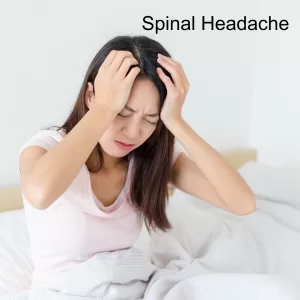
Bad headache that feels worse when you sit up and better when you lie down? Severe headache that lasts for days or weeks? This might be a spinal headache, also known as a post-dural headache or low CSF pressure headache. Acupuncture treatment and TCM remedies can help relieve the intense pain of a spinal headache.
What Is a Spinal Headache?
A spinal headache is a type of headache that can occur after medical procedures like a spinal tap (lumbar puncture) or an epidural block, often used during labor and delivery. These headaches are caused by a leak of cerebrospinal fluid (CSF), which leads to changes in pressure around the brain and spinal cord.
CSF surrounds the brain and spinal cord, providing cushioning and support, while also aiding in waste removal from the brain. If the fluid pressure drops—usually due to a tear in the protective meninges—the brain can sag downward when the individual is upright, leading to pain and other symptoms.
During a spinal tap or similar procedure, a needle is inserted into the fluid-filled space around the spinal cord. Occasionally, this puncture can cause spinal fluid to leak out.
When too much fluid escapes, it disrupts the pressure that cushions the brain and spinal cord, potentially leading to a spinal headache. This fluid leakage can cause stretching of the tissues around the brain and nerves that support it, sometimes resulting in the severe pain of a post-dural headache.
What Causes Low CSF Headache?
Common causes of CSF leaks include:
- Having a spinal tap procedure (lumbar punctures).
- Epidural during labor and delivery.
- Injuries to the meninges (the protective covering of the brain and spinal cord).
Spinal headaches affect 10% to 40% of people who undergo lumbar punctures or epidural anesthesia. The symptoms, such as severe, positional headaches, often resolve on their own, but they can last for days or even weeks in some cases.
Spinal Headache Symptoms
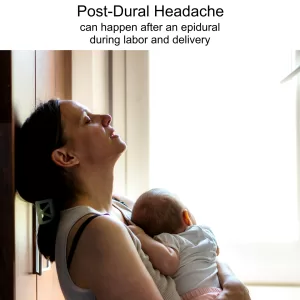
The most common symptom of a post-dural headache is positional pain. The headache is worse when you are standing or sitting upright and subsides when you are lying flat.
Typically absent when you wake up in the morning, symptoms often develop shortly after getting out of bed.
Other symptoms of low CSF headache include:
- Headache pain: Dull, throbbing, and worsened by sitting or standing; improved by lying down.
- Dizziness
- Tinnitus (ringing in the ears)
- Hearing loss
- Blurred or double vision
- Sensitivity to light
- Nausea
- Stiff neck
Treatment for Spinal Headache
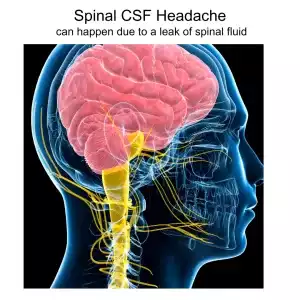
While many spinal headaches resolve on their own within a few days to two weeks, persistent cases may require treatment.
In Western medicine, spinal headaches are typically managed with simple measures such as rest, hydration, and over-the-counter pain relievers.
Fluids may be administered intravenously, to help restore CSF pressure.
Drinking caffeinated beverages, like coffee or tea, may be recommended, because caffeine constricts blood vessels and increases cerebrospinal fluid production.
Medications like gabapentin (used to treat nerve pain), hydrocortisone, or theophylline (which may help build more CSF may be prescribed if other remedies are ineffective.
When symptoms persist, more invasive treatments may be needed, such as an epidural blood patch. This procedure involves injecting a small amount of your own blood near the puncture site to seal the leak, offering rapid relief near the site of the leak to seal it. Another option is a glue injection: using X-ray guidance, doctors can seal leaks with medical glue.
In rare cases, surgery might be recommended.
While these methods are effective, they don’t address the underlying imbalances or promote the body’s self-healing capabilities in the way that acupuncture and TCM can.
Can Acupuncture Help Spinal Headache?
In Traditional Chinese Medicine, spinal headaches are not viewed as isolated conditions but as manifestations of deeper imbalances within the body.
TCM practitioners consider spinal headaches a type of head pain related to disruptions in the flow of Qi (energy) and Blood in the body.
Several TCM patterns may contribute to spinal headaches:
- Qi and Blood Deficiency: Weakness from CSF loss can lead to a deficiency of Qi and Blood, resulting in fatigue, dizziness, and headaches.
- Kidney Deficiency: The Kidney is closely related to the spine and brain in TCM. A deficiency in Kidney energy can cause spinal fluid imbalances.
- Liver Qi Stagnation: Stress and emotional strain may block the free flow of Qi, intensifying headache pain.
- Phlegm Obstruction: Excess fluids or “Phlegm” in TCM can block energy pathways, leading to dizziness, nausea, and heaviness in the head.
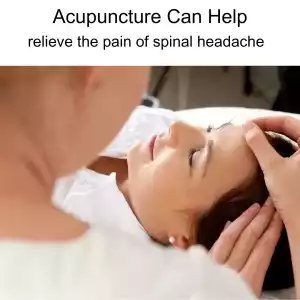
One clinical trial looked at 60 patients in three groups: one group received conventional care with pharmaceuticals for spinal headache, one group received acupuncture treatment, and one group received sham acupuncture (placebo).
The results for the patients who received acupuncture were similar to those who had been given medication and those who had been given acupuncture, while the placebo group had lower scores. This trial concluded that acupuncture was a good alternative to drugs for spinal headache pain.
Another case study followed 6 patients who were suffering from post-dural headaches after having given birth. All of them agreed to receive acupuncture treatment. Four of the patients got immediate relief after starting treatment. Two patients reported having some temporary relief, but then went on to have blood patch procedures.
Acupuncture Near Me for Spinal Headache
Even though a post-dural headache will usually go away on its own within days or weeks, it can seriously compromise a person’s well-being in the meantime. If you or a loved one is experiencing a low CSF headache, please do not hesitate to reach out to us at Art of Wellness Acupuncture in West L.A.. Doctors Tan and Cai have over three decades of experience helping patients find relief from severe headaches due to all kinds of causes.
*This article is for education from the perspective of Traditional Chinese Medicine only. The education provided by this article is not approved by FDA to diagnose, prevent, treat and cure human diseases. It should not stop you from consulting with your physician for your medical conditions. Traditional Chinese Medicine is based on Qi, which is an invisible force that usually cannot be observed by modern science. Because science focuses on testing ideas about the natural world with evidence obtained through observation, these aspects of acupuncture can’t be studied by science. Therefore acupuncture and Chinese herbs are often not supported by double-blind, randomized trials, and they are considered alternative medicine therapies in the United States.
How to Treat Sinusitis With Acupuncture and TCM
By Xiaomei Cai, L.Ac., Ph.D. and Qineng Tan, L.Ac., PhD.
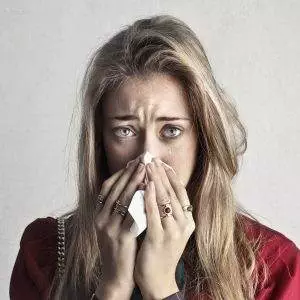
Stuffy nose, nasal congestion, sinus pressure or sinus headache? Lost your sense of smell? These could be sinusitis symptoms. Acute sinusitis is a sinus infection that can cause sinus pain, postnasal drip, and difficulty breathing. Acupuncture and TCM can help relieve sinus congestion and prevent chronic sinusitis.
The sinuses are four sets of hollow cavities inside the head (forehead, cheeks, and nose) that produce mucus and then allow it to drain through the nasal passageways. This process helps keep bacteria and allergens out of your nose.
What causes sinusitis? Sinusitis occurs when a sinus infection causes the sinuses to become inflamed and not drain properly. This usually happens because of a viral infection, like the common cold, or a bacterial infection or fungal infection. A long-term candida infection can also contribute to the development of sinusitis.
Sinusitis can seem similar to rhinitis, also known as allergic rhinitis. Rhinitis refers to swelling and inflammation inside the nose, and can also cause symptoms like nasal congestion. The difference is that rhinitis is brought on by an allergic reaction—commonly “hay fever,” or seasonal allergies—instead of an infection, and rhinitis is centered in the nasal passages, rather than the sinuses.
Factors like allergies, asthma, structural blockages, or weakened immune systems can elevate the risk of someone getting sinusitis. When the sinuses are blocked, bacteria and other pathogens can proliferate more easily.
Acute sinusitis usually clears up on its own in about 10 days, although getting acupuncture treatment and herbs can help bring relief sooner.
If sinus pain, stuffed up nose, and yellow-green mucus are still present after two weeks, it may mean that there is an infection that isn’t clearing up.
People are more at risk for developing sinusitis if they have:
- Seasonal allergies, hay fever
- Large adenoids (tonsils)
- Cystic fibrosis
- Smoke cigarettes
- Weak immune system due to HIV
- Take immunotherapy for autoimmune condition
- Unusual formation of the sinuses
- Are in an environment where they are exposed to lots of germs, such as day care
About 14% of Americans are diagnosed with chronic sinusitis every year; it’s one of the most common reasons that people will be prescribed antibiotics. However, if the sinusitis is occurring due to a viral infection, antibiotics are not really helpful.
TCM modalities of acupuncture, herbs, and moxibustion can help relieve symptoms of sinusitis and sinus pain, as well as helping to address allergies, asthma, clear up infections, improve immune function, and reduce inflammation.
Chronic Sinusitis and Nasal Polyps
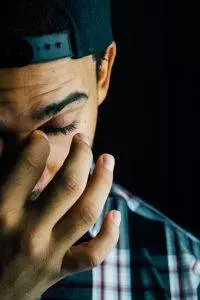
It is fairly common for people with chronic sinusitis to also have nasal polyps. Nasal polyps develop when the nasal tissue becomes swollen and inflamed to such a degree that fluid-filled sacs form.
If a person also suffers from allergies, then exposure to an allergen can cause the nasal polyps to become inflamed to the point that they block the nasal passages, causing difficulty breathing. When a person can’t breathe through their nose at night, in particular, it can lead to snoring and even sleep apnea.
Chinese herbal formulations that have antibacterial and antifungal properties can help to relieve overproduction of mucus and prevent nasal polyps from coming back.
Acupuncture treatment can also help people breathe easier and sleep better, stop snoring and relieve sleep apnea.
Top 5 Sinusitis Symptoms
Sinusitis typically begins with the usual symptoms of the common cold. Then, instead of clearing up after several days, the symptoms get worse. Symptoms of sinusitis include:
- Stuffy nose: thick, yellow, or greenish mucus causes a runny nose
- Postnasal drip: when mucus drips down the throat. Postnasal drip can be particularly uncomfortable at night, when you’re trying to sleep.
- Nasal Congestion: A blocked or stuffy nose makes it hard to breathe through the nasal passages.
- Sinus headache or Facial Pain: Pain, tenderness, and pressure around the eyes, cheeks, nose, or forehead, especially intensified when bending over.
- Loss of smell: Altered sense of smell.
Other signs of sinusitis may Include:
- Ear pressure
- Toothache
- Cough
- Sore throat
- Bad breath
- Fatigue
- Fever
Sinusitis Treatment
Medical treatment to help relieve symptoms of sinusitis typically involves:
- Regularly spraying saline nasal spray (or saltwater) into the nose helps rinse the nasal passages.
- Corticosteroid nasal sprays, such as fluticasone and budesonide, prevent and treat swelling in the nasal passages.
- Over-the-counter decongestants in liquid, tablet, or nasal spray can help relieve nasal congestion. However, nasal decongestants should be used for a limited time to avoid rebound congestion.
- If sinusitis is allergy-related, allergy medicines can alleviate allergy symptoms.
- Acetaminophen, ibuprofen, or aspirin may be recommended to manage face pain and sinus headaches.
- Antibiotics: Since acute sinusitis is often viral, antibiotics, which target bacteria, may not be immediately prescribed. Providers may adopt a “wait and see” approach, reserving antibiotics for severe, worsening, or prolonged cases.
For cases of sinusitis linked to allergies, immunotherapy, commonly in the form of allergy shots, may be recommended. Immunotherapy aims to desensitize the immune system to specific allergens, potentially reducing sinusitis symptoms triggered by allergies.
Acupuncture and Chinese herbs can provide a safe alternative treatment for sinusitis, without the side effects that some of these medications can cause.
Can Acupuncture Help Sinusitis?
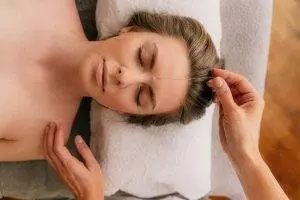
TCM has been used for centuries to treat sinus conditions. An acupuncturist will carefully observe each individual patient’s symptoms and experience to determine whether warming or cooling herbs are necessary to help relieve sinus congestion and treat the underlying cause of the problem.
According to TCM theory, sinusitis can result from external factors of wind and cold, which can weaken the lungs, preventing the lung system from doing its job of protecting the body from infections. In TCM, we say that the spleen produces phlegm, and the lungs store phlegm.
In some cases, it is necessary to nourish the Spleen Qi in order to address underlying causes of mucus buildup and improve immune system function.
Specific acupuncture points can be very helpful for relieving sinus pressure, sinus headaches, and other symptoms of sinusitis. A few examples include Shen Ting (“Spirit Court”), Yin Tang (“Hall of Impression”), Ying Xiang (“Welcome Fragrance”), and Zhanzu.
One study of patients with sinusitis treated with acupuncture showed a 60% reduction in sinus pain, and significantly improved air flow.
Another study showed that patients who had already had surgery for nasal polyps who received Chinese herbs in addition to conventional medical treatment had better quality of life, with less symptoms of nasal discharge, difficulty breathing, and bad breath.
A review of studies pertaining to TCM treatment for chronic rhinitis concluded that acupuncture is indeed an effective alternative or adjunct treatment for symptomatic improvement.
A study that offered acupuncture treatment and herbal formulations to help relieve nasal polyps found that this method helped prevent the recurrence of polyps.
Acupuncture Near Me for Sinusitis
Sinusitis, nasal polyps, and rhinitis are common conditions that cause a lot of discomfort for millions of people every year. If you or someone in your family is prone to recurrent infections that cause sinus pain and pressure, it may be time to try alternative medicine to help address the underlying causes of sinus headache and a constant stuffy nose and postnasal drip.
*This article is for education from the perspective of Traditional Chinese Medicine only. The education provided by this article is not approved by FDA to diagnose, prevent, treat and cure human diseases. It should not stop you from consulting with your physician for your medical conditions. Traditional Chinese Medicine is based on Qi, which is an invisible force that usually cannot be observed by modern science. Because science focuses on testing ideas about the natural world with evidence obtained through observation, these aspects of acupuncture can’t be studied by science. Therefore acupuncture and Chinese herbs are often not supported by double-blind, randomized trials, and they are considered alternative medicine therapies in the United States.
How to Treat BPPV (Vertigo) With Acupuncture and TCM
By Qineng Tan, L.Ac., Ph.D. and Xiaomei Cai, L.Ac. Ph.D.

Dizzy when lying down? Waking up dizzy? Head spinning sensation when you move from one position to another? These could be BPPV symptoms. Benign Paroxysmal Positional Vertigo (BPPV) is a common vertigo cause. Acupuncture and TCM offer an alternative or adjunct BPPV treatment to help relieve positional dizziness.
Benign Paroxysmal Positional Vertigo (BPPV) is one of the most common causes of vertigo, a condition characterized by a feeling that the room is spinning.
BPPV is an inner ear disorder that affects the vestibular system, which controls your sense of balance. BPPV causes you to feel dizzy. The words “positional vertigo” in the name refer to the fact that the dizziness happens after you move your head, either by tilting or turning it, or you get dizzy when getting up from laying down.
Unlike some other forms of vertigo, BPPV is considered relatively harmless; hence the word “benign” in the name. However, its sudden and unpredictable nature can be very unsettling, and have a real impact on your daily life.
BPPV occurs when small calcium particles called otoconia, which are normally located in the inner ear, become dislodged and migrate into one of the ear’s semicircular canals. When these particles move with changes in head position, they can disrupt the normal flow of fluid in the canals, sending incorrect signals to the brain about the body’s position. This mismatch between visual and vestibular signals leads to the characteristic symptoms of BPPV.
What Causes BPPV?

In most cases, doctors do not find a clear BPPV cause when patients see them about recurring dizziness. However, it is possible for certain conditions to possibly cause BPPV. These could include:
- Head injury, head trauma
- Migraine headaches, vestibular migraine
- Meniere’s disease
- Labyrinthitis
Migraine associated vertigo is common, and vice versa; people with BPPV are more likely to experience vestibular migraine, or a migraine headache due to problems with the inner ear. Patients who have BPPV treatment in the form of repositioning, as discussed below, may also be more likely to have migraines afterwards.
Top 10 BPPV Symptoms
That dizzy, spinning sensation is the primary, recognizable symptom of vertigo, but when a person has BPPV, there may be other signs, too. These are the most common symptoms of BPPV:
- Dizziness: Sudden and intense episodes of dizziness, often triggered by changes in head position, such as rolling over in bed or tilting your head back.
- Vertigo: A spinning or whirling sensation, as if the room is rotating around you. This sensation is usually brief but can be severe.
- Light-headed: feeling faint or dizzy.
- Nystagmus: Involuntary, rapid eye movements, typically triggered when changing head position. These eye movements are a hallmark of BPPV and can help doctors diagnose the condition. It may feel like you’re seeing wavy lines or objects around you “jumping” or moving.
- Blurred Vision: the inner ear is connected with the eye muscles, so this imbalance can affect vision, and even cause foggy vision, double vision, and/or sensitivity to light.
- Imbalance: Difficulty maintaining balance, especially when getting up from a lying or seated position. This can lead to unsteadiness and an increased risk of falling.
- Nausea: Some people with BPPV may experience nausea or vomiting, particularly during severe vertigo episodes.
- Fatigue: The unpredictability of BPPV attacks and the effort required to maintain balance during episodes can lead to feelings of exhaustion.
- Anxiety: BPPV can cause anxiety, as individuals may fear the sudden onset of vertigo and its potential impact on their daily activities.
- Tinnitus: Some individuals with BPPV may experience ringing in ear or buzzing in the affected ear, or even hearing loss.
BPPV Treatment and Diagnosis
There really are no lab tests that confirm a diagnosis of BPPV. A doctor will usually perform a test called the Dix-Hallpike maneuver, in which you are asked to turn your head and lie down, and then sit up again 20 to 30 seconds later. During this test, the physician will carefully observe for signs of nystagmus, the rapid eye movement that is one of the classic signs of BPPV.
A doctor may perform other tests like an MRI or CT scan to rule out other possible causes of vertigo.
Sometimes, doctors will recommend a wait and see approach, as many times, BPPV symptoms will resolve on their own in a matter of weeks or months.
Benign paroxysmal positional vertigo treatments can include vestibular suppressant medication. Medications for BPPV aim to provide vertigo treatment that reduces symptoms of dizziness and nausea.
Benzodiazepines, like Valium, may be prescribed because they can help reduce acute vertigo and the sensations of motion sickness. These medications can be habit-forming and have side effects. They also have to be reduced gradually, because of withdrawal symptoms.
Antihistamines, like Benadryl, may be recommended, as they can also reduce feelings of nausea.
Anticholinergics are vestibular suppressants that block receptors in the nervous system. They are used to treat many conditions that involve involuntary movement. However, they can cause a lot of side effects and worsen other conditions like prostate problems, irregular heartbeat or rapid heartbeat, glaucoma, dementia, and depression.
None of these medications address the root cause of dizziness.
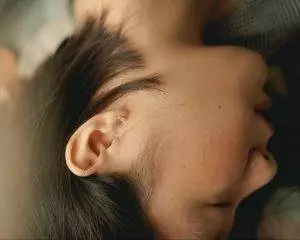
The preferred treatment for BPPV is usually a canalith repositioning procedure (CRP) can be done with one of a few different maneuvers that doctors can perform to try to move the particles in the inner ear that are causing BPPV. These are often helpful in the short term to relieve vertigo, but often patients do have a recurrence of BPPV symptoms again.
For some people, repositioning is not a good option—if you have problems with your cervical spine, or serious cardiovascular problems, for example.
Acupuncture and TCM offer an alternative treatment for BPPV that can relieve dizziness and other vertigo symptoms without any unwanted side effects.
Can Acupuncture Help BPPV?
According to TCM theory, phlegm is one of the pathogenic forces that can take hold in the body, along with things like dampness, dryness, etc. Phlegm builds up when fluids in the body are not being transported and moving the way they should; they get caught in an area and become condensed and thick, causing blockages of energy and movement.
The San Jiao, or “triple burner,” is an important concept used in TCM theory; the San Jiao controls the movement of fluids in the body. In cases of vertigo, phlegm and heat become stagnant due to the malfunctioning of the Jiao. This causes phlegm to be pushed upwards in the body.
In TCM, we may diagnose BPPV and other vestibular problems as having their root cause in a buildup of phlegm in the head that is causing a blockage in the inner ear.
Wind is another pathogenic force that can get into the body and cause problems that seem to come and go. Some cases of dizziness may be due to wind in the head.
Thus, the TCM protocols for BPPV treatment will aim to clear dampness, phlegm, and wind, and get fluids and Qi energy moving again.
Herbs can play an important role in treating vertigo. Chinese herb formulas that warm Yang energy and strengthen the kidneys and spleen can help to clear phlegm.
Use of specific acupoints with acupuncture treatment can help relieve vertigo—sometimes patients feel much less dizziness, even after one treatment. Not only can TCM treatment for BPPV help improve vertigo right away, but regular acupuncture session can help prevent bouts of dizziness from happening.
Acupuncture Near Me for BPPV in Los Angeles, Santa Monica
TCM is a great modality for helping to relieve dizziness due to all types of health conditions, including migraines, POTS, Ehlers-Danlos Syndrome, Meniere’s disease, multiple sclerosis (MS), diabetes, sinus issues, ear infections, and the side effects of medications. Acupuncture can be an excellent alternative for vertigo if other treatments have not helped. Dr. Tan and Dr. Cai at Art of Wellness in West L.A. can help get to the bottom of recurring dizziness, so you can feel steady again.
*This article is for education from the perspective of Traditional Chinese Medicine only. The education provided by this article is not approved by FDA to diagnose, prevent, treat and cure human diseases. It should not stop you from consulting with your physician for your medical conditions. Traditional Chinese Medicine is based on Qi, which is an invisible force that usually cannot be observed by modern science. Because science focuses on testing ideas about the natural world with evidence obtained through observation, these aspects of acupuncture can’t be studied by science. Therefore acupuncture and Chinese herbs are often not supported by double-blind, randomized trials, and they are considered alternative medicine therapies in the United States.
How to Treat POTS With Acupuncture and TCM
By Qineng Tan, L.Ac., Ph.D. and Xiaomei Cai, L.Ac., Ph.D.

Do you often feel shaky, like you’re fainting, or experience dizziness, especially when you’re getting up from sitting down or lying down? Do you feel like you have a rapid heartbeat, or shortness of breath? Postural orthostatic tachycardia syndrome, known as PoTS syndrome, or POTS, is a condition that causes unstable blood pressure when changing positions. Acupuncture and TCM can help relieve dizziness and other symptoms of POTS.
Postural tachycardia syndrome (or postural orthostatic tachycardia syndrome) is a chronic disorder related to the autonomic nervous system that causes people to experience dizziness and increased heart rate when they move into an upright position; this is known as orthostatic intolerance, which is a type of dysautonomia.
POTS syndrome is fairly common, affecting up to 3 million people in the U.S. POTS occurs more often in people assigned female at birth, and often first shows up during the teenage years.
The most common symptom of POTS is feeling light-headed when changing your position from sitting to standing, or when getting up from lying down.
Whenever we have been sitting or lying down for a while, blood pools in the lower parts of the body. When we get up, the autonomic nervous system starts a series of actions to move blood back up into the top half of the body. This involves squeezing blood vessels, and releasing adrenaline and norepinephrine, to make the heart beat faster.
When a person has POTS, more blood tends to pool in the legs, and the nervous system process doesn’t cause the normal, quick response from the blood vessels, so more hormones are released, which can cause the person’s heart rate to increase, and a dizzy, faint feeling.
Medical science has not yet discovered exactly what causes POTS, but there are different characteristics that allow for categorizing these different types of POTS syndrome:
- Neuropathic POTS – damage to small fiber nerves that control blood vessel constriction in the abdomen and limbs
- Hyperadrenergic POTS – when a person has elevated levels of norepinephrine
- Hypovolemic POTS – when a person has unusually low blood levels
- Secondary POTS – when POTS symptoms are related to another condition that causes neuropathy, such as Lyme disease, diabetes, or autoimmune disorders like Lupus or celiac disease.
While POTS is not rare, it can be difficult to get a diagnosis, because the criteria can be vague, and the symptoms can so often be related to other conditions, or just seem “normal.”
For many people, POTS is truly debilitating and can have a serious, negative impact on daily life. It can also contribute to feelings of anxiety and depression. Acupuncture and TCM offer an adjunct or alternative treatment for POTS that can help with dizziness, irregular heartbeat, digestive problems, muscle weakness, migraines, trouble sleeping, and other symptoms, all at the same time.
Top 10 POTS Symptoms
The primary symptoms of POTS are related to the cardiovascular system: rapid heartbeat, and dizziness. However, there can be many other POTS symptoms.
- Irregular heart rate, rapid heart rate, fast heartbeat, chest pain, heart palpitations
- Dizziness, especially when standing up or getting up from lying down, feeling faint
- Breathing problems: hyperventilating, bronchial asthma, shortness of breath
- Constipation, diarrhea, nausea, abdominal pain
- Muscle weakness, muscle pain, tremor
- Skin rash, flushed face, flushing, sweating
- Migraine headaches
- Cognitive issues, brain fog, difficulty concentrating
- Trouble sleeping
- Frequent urination, nocturia
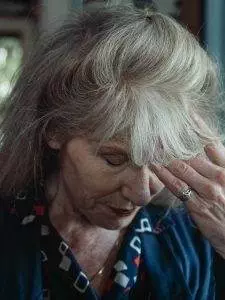
Other symptoms of POTS may include: tinnitus (ringing in the ears), blurred vision, red or purple appearance of the legs when standing up, and a “jittery” feeling or general nervousness.
As with many syndromes, different people will experience different combinations of symptoms. While dizziness and rapid heartbeat are the signs most commonly associated with POTS, many people with POTS will also suffer from abdominal pain and gastrointestinal problems, perhaps without realizing there is a correlation.
POTS symptoms may resemble many other conditions, such as:
- Chronic fatigue syndrome, ME/CFS
- Graves disease
- Other heart conditions that involve tachycardia
- Anemia
- Stroke
- Epilepsy
- Adrenal fatigue
- Drug use
- Eating disorders
- Benign paroxysmal positional vertigo
- Ménière’s disease
Because POTS is often misunderstood or misdiagnosed, many patients will be offered medications to manage headaches, vertigo, or depression, which may not offer much relief.
Medical Treatment for POTS
As there is no definitive cure for POTS, Postural orthostatic tachycardia syndrome treatments typically aim to manage symptoms and improve quality of life.
Dietary modifications are a fundamental component of POTS management. Adequate daily fluid intake is crucial. A diet that includes plenty of salt helps maintain blood volume, aiding blood flow to vital organs. Patients are typically advised to avoid alcohol and carefully monitor caffeine intake, as these substances can exacerbate symptoms.
Exercise is gradually introduced, often starting in reclined or horizontal positions, with the goal of increasing exercise tolerance over time. Physical therapy helps retrain the autonomic nervous system, enhancing blood circulation.
Compression garments can help reduce blood pooling, and specific postures while sitting or sleeping may alleviate symptoms. Identifying triggers such as prolonged sitting, heat, or certain drugs allows for better symptom control. Regular monitoring of blood pressure and pulse, along with adequate sleep hygiene, aids overall well-being.
While no single pharmacological solution is universally effective, some medications may be prescribed based on individual symptoms. These may help to improve blood volume, aid sodium retention, reduce heart rate, and enhance blood vessel constriction.
While POTS symptoms may intermittently improve with medications and lifestyle modifications, the underlying cause of POTS may persist. Acupuncture and TCM treatment can provide a holistic solution for individuals living with POTS, which may help to address the root causes of this syndrome.
Can Acupuncture Help POTS?
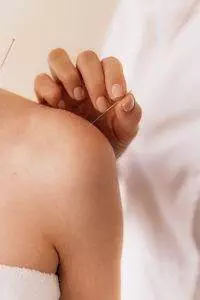
POTS is a kind of Dysautonomia; this is a general term that describes conditions that involve malfunctioning of the autonomic nervous system. This causes people’s bodies to have problems with regulating the sorts of functions that are typically automatic, like the beating of the heart, circulation of blood, breathing, and temperature control.
Western medicine offers some treatments that can help address individual symptoms of dysautonomia, but it does not have a way of treating the root of the problem. It can be difficult to get proper treatment, because people who suffer from POTS and other kinds of dysautonomia often seem reasonably healthy, and their complaints—dizziness, headaches, mental health problems—seem vague.
Acupuncture and TCM have been used to treat these kinds of problems for centuries. Acupuncture treatment can help provide positive effects on the subtle communications of the nervous system, as well as the heart rate, and physiological symptoms of anxiety. According to TCM theory, several organ systems may be involved and need support: not only the heart, but also the kidneys or spleen.
Studies have shown that acupuncture for dysautonomia can help relieve symptoms like heart palpitations, insomnia, and digestive problems.
A qualified acupuncturist is also well-versed in nutrition and can offer more detailed information regarding dietary and lifestyle changes that can help each individual patient. Your TCM provider will spend time learning more about you, so that they can offer personalized advice.
Acupuncture Near Me for POTS in West Los Angeles
TCM and acupuncture can help people with all types of autoimmune disorders, nerve disorders, and conditions involving fatigue and dizziness that may be difficult to solve with conventional methods. Acupuncture works on a deeper, more subtle level to help address complex syndromes. If you are regularly experiencing trouble with feeling light-headed, having unexplained headaches and sleep problems, it may be time to seek a more holistic alternative treatment.
*This article is for education from the perspective of Traditional Chinese Medicine only. The education provided by this article is not approved by FDA to diagnose, prevent, treat and cure human diseases. It should not stop you from consulting with your physician for your medical conditions. Traditional Chinese Medicine is based on Qi, which is an invisible force that usually cannot be observed by modern science. Because science focuses on testing ideas about the natural world with evidence obtained through observation, these aspects of acupuncture can’t be studied by science. Therefore acupuncture and Chinese herbs are often not supported by double-blind, randomized trials, and they are considered alternative medicine therapies in the United States.
How to Treat Encephalitis With Acupuncture and TCM
By Xiaomei Cai, L.Ac., Ph.D. & Qineng Tan, L.Ac., Ph.D.
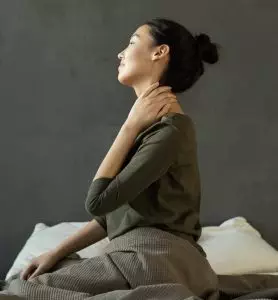
Headache, sensitivity to light, stiff neck, short-term memory loss? These could be signs of encephalitis, or inflammation in the brain. Infectious encephalitis can happen due to an infection; autoimmune encephalitis (AIE) is a type of autoimmune disorder. Acupuncture and TCM offer an adjunct treatment for encephalitis recovery.
What is encephalitis? Encephalitis refers to a serious condition in which the tissues of the brain become inflamed. It can happen to anyone, but is more common among children and older people.
The symptoms of encephalitis are sometimes ignored, because headaches, neck pain, and “brain fog” are so common and may not seem that serious at first. However, in combination, these signs should not be taken lightly. Like meningitis (inflammation of the membrane surrounding the brain and spinal cord), encephalitis can cause serious complications if left untreated. Encephalitis needs to be caught early and treated in order for people to make a full recovery.
What causes encephalitis? Brain inflammation can be caused by the body’s immune response to an infection, or due to an autoimmune disorder, in which the body produces antibodies that attack the brain tissues.
Top 10 Causes of Encephalitis
Viral infections are the primary reason that people develop encephalitis. These could be viruses carried by insects, especially mosquitoes, which are then contracted by humans through bites. Other communicable viral infections that pass from person to person through bodily fluids or close contact can also cause infectious encephalitis.
Infections that can lead to encephalitis include:
- Mosquito-borne viruses such as: West Nile Virus, Eastern Equine encephalitis, Western Equine encephalitis, St. Louis encephalitis, LaCrosse encephalitis
- Tick-borne viruses
- Rabies virus – can be contracted through being bitten by an infected animal
- Polio virus
- Herpes Simplex, Type 1 and Type 2 (HPV1 and HPV2)
- Epstein-Barr virus (mono, mononucleosis)
- Varicella Oster virus (chicken pox, shingles)
- Measles (rubeola)
- German measles (rubella)
- Mumps
There have been cases of people developing encephalitis as a complication of a COVID-19 infection.
Some cases of encephalitis can be caused by bacterial or fungal infections, or by a parasite. It could also be caused by exposure to some sort of allergen or toxin in the environment.
People with weakened immune systems—for example, due to HIV/AIDs—or who take immunosuppressant medications are at a higher risk for developing encephalitis.
Immunotherapy used to treat certain kinds of cancer, such as melanoma, ovarian cancer or lung cancer, has been shown to cause encephalitis in some cases.
Some cases of autoimmune encephalitis, called Anti-NMDAR encephalitis, appear to be related to a certain kind of tumor called a teteroma. In women and young women, especially, this can be an ovarian tumor that produces the antibodies for NMDAR.
Symptoms of Encephalitis
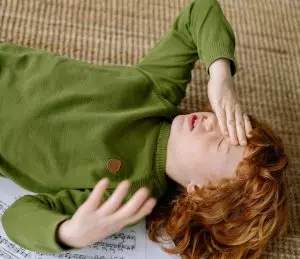
A mild case of encephalitis might only cause some flu-like symptoms that clear up within a few weeks. These types of symptoms include:
- Headache
- Stiff neck, neck pain
- Muscle aches, joint pain
- Fever
- Fatigue, feeling tired and weak
- Sensitivity to light
More severe symptoms of encephalitis can affect both cognitive and motor function:
- Mental confusion, brain fog, difficulty concentrating
- Memory problems, short term memory loss
- Hallucinations
- Seizures
- Severe headache
- Trouble with coordination or balance
- Loss of sensations in parts of the body or face
- Loss of muscle control in parts of the body or face
- Problems with speaking or hearing
- Mood swings, changes in personality
Anti-NMDAR encephalitis (when there may be an ovarian tumor involved, especially) can cause symptoms like pro-domal headache, nausea, and fever, which may then progress to more severe complications, including involuntary movements or tremors, urinary incontinence, rapid heartbeat, and psychiatric symptoms like anxiety, paranoia, or mania.
In severe cases, encephalitis can cause loss of consciousness and even cause a person to go into a coma. It is very important to seek urgent medical attention if you experience any of these symptoms.
Treatment for Encephalitis

Blood tests can confirm whether a viral or bacterial infection is causing encephalitis. Imaging tests like an MRI or CT scan may show the inflammation in the brain. A spinal tap may show an imbalance in cerebral fluids, or an EEG may show unusual electrical impulses in the brain.
However, there are times when these tests will not show exactly what is causing the encephalitis. As with many autoimmune disorders, it can be hard to pinpoint a clear diagnosis for autoimmune encephalitis (AIE).
Medical treatment for encephalitis will depend on what type it is determined to be. Mild inflammation will usually be treated with over the counter anti-inflammatory medications. Antivirals or antibiotics will be prescribed if a specific infection is found to be the cause. Steroids will often be used to help reduce inflammation. In more serious cases, a person may require breathing assistance or anti-seizure medications.
In cases where the cause is believed to be an autoimmune response, immunotherapy is used to try to interfere with the antibodies that are attacking the brain tissues. Steroids will be usually used in combination with other treatments. Plasmapheresis, or plasma exchange, removes some of these antibodies from the blood. Intravenous immunoglobulin therapy introduces healthy antibodies to block the action of the malfunctioning antibodies.
In cases of anti-NMDAR encephalitis where a tumor is present, treatment will include the removal of the tumor in addition to immunotherapy. Patients with this type of encephalitis may also be prescribed antipsychotic drugs to relieve psychiatric symptoms.
Immunotherapy works for some patients, but not all. Many patients will be offered second-line treatments such as monoclonal antibodies or antimetabolites. In some cases, people may seem to recover from encephalitis for a while, and then have a relapse in which the inflammation flares up again.
Most people will need significant time and rehabilitation to help them make a full recovery from encephalitis. Some people will have long-lasting effects, such as memory problems, balance and coordination issues, speech problems, and emotional volatility.
Many of the pharmaceutical treatments available for encephalitis cause significant side effects and can even lead to more physical, emotional and mental health issues. Fortunately, acupuncture and other TCM modalities offer a way to reduce inflammation in the brain and help relieve encephalitis, as well as helping to offset any side effects from other medical interventions.
Can Acupuncture Help Encephalitis?

With acupuncture and Chinese herbs, we seek to treat the root cause and the various symptoms and complications of each condition according to recognizable patterns. This allows us to effectively treat some conditions, such as autoimmune diseases, neurological disorders, and inflammatory conditions that may not readily respond to conventional medicine.
In the TCM view, inflammation occurs because there is too much heat in the body. Yang energy provides the “fire” we need to keep the body warm and energetic. But, if there is an imbalance, and too much heat, this leads to conditions like fever, infections, and inflammation. So, we see pathogenic internal heat as contributing to encephalitis, in addition to outside pathogens like viruses or bacteria. To clear heat that is trapped or stagnant in the body, we will use specific herbs and cooling foods, along with acupuncture treatment and lifestyle changes to reduce physical and mental stress. TCM herbs can also be highly effective against bacterial and viral infections.
The motor control and cognitive problems that can result from encephalitis occur because the inflammation in the brain is affecting the functioning of the central nervous system. With acupuncture, we can help to reestablish connections and neural pathways.
Autoimmune disorders are still not well understood by Western medicine, but with acupuncture we can help to balance and regulate the immune system, so that it is not being inappropriately triggered. This is why acupuncture works well as an adjunct treatment for encephalitis and many other autoimmune disorders.
Acupuncture Near Me for Encephalitis in Los Angeles and West Los Angeles
It can be very difficult when you or someone you love is facing a serious illness and a long, difficult recovery. TCM offers a healthcare option that treats each person in a highly individualized and caring way. At Art of Wellness, we have over 30 years of experience helping people gain back their strength and mobility after suffering from conditions like encephalitis, meningitis, Lyme disease, Guillain Barré Syndrome, Myasthenia Gravis, and many others.
*This article is for education from the perspective of Traditional Chinese Medicine only. The education provided by this article is not approved by FDA to diagnose, prevent, treat and cure human diseases. It should not stop you from consulting with your physician for your medical conditions. Traditional Chinese Medicine is based on Qi, which is an invisible force that usually cannot be observed by modern science. Because science focuses on testing ideas about the natural world with evidence obtained through observation, these aspects of acupuncture can’t be studied by science. Therefore acupuncture and Chinese herbs are often not supported by double-blind, randomized trials, and they are considered alternative medicine therapies in the United States.